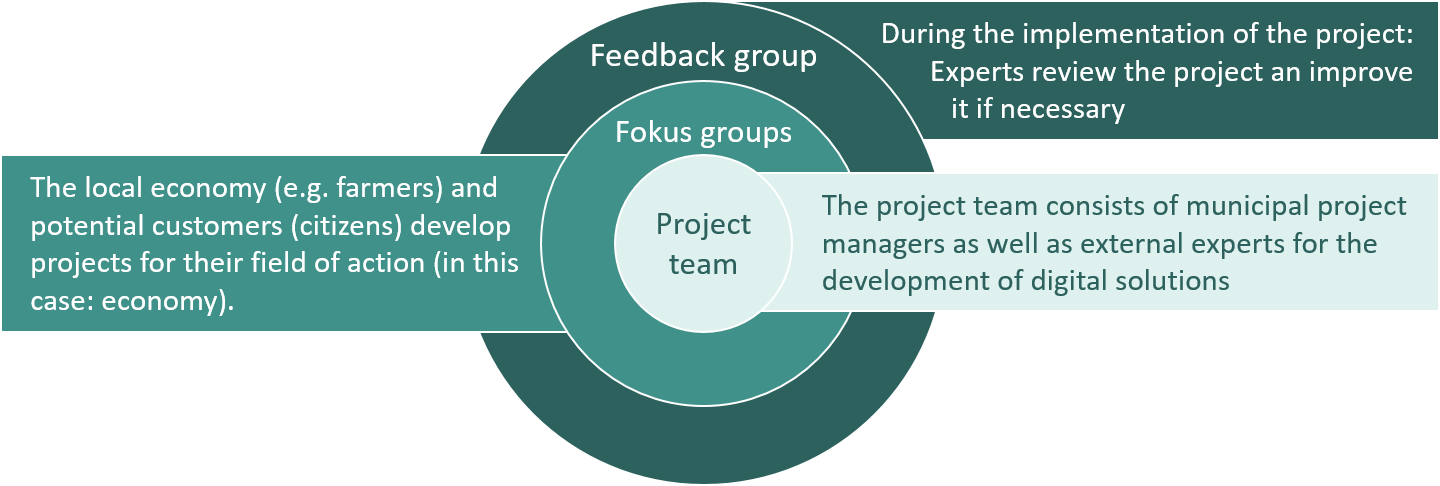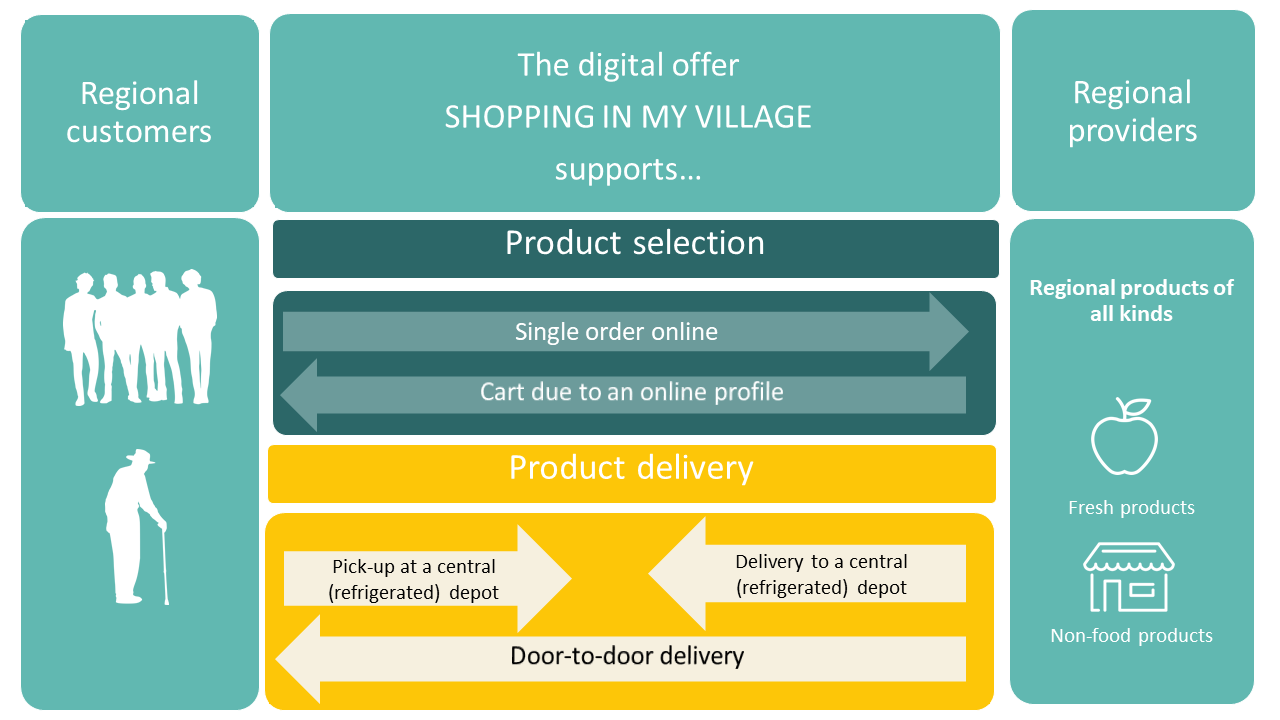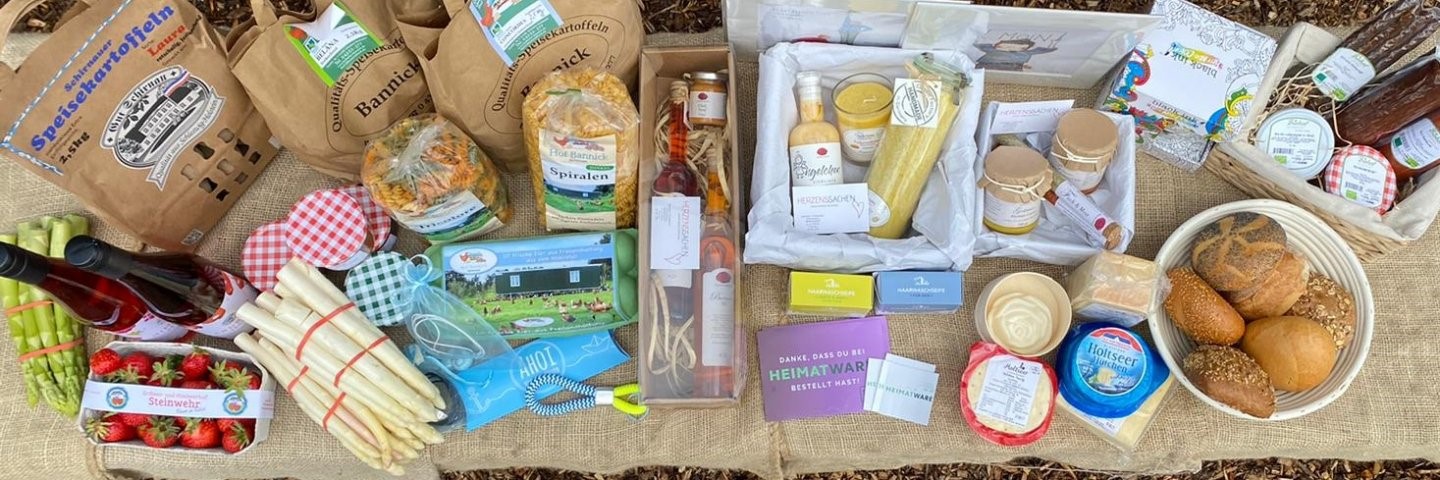Shopping in my village
Creating digital solutions for promotion and purchase of local products in Hüttener Berge, Germany
There are many farmers, traders and service providers living in the collective municipality of Hüttener Berge, Germany, who offer great local products. Most of them are not yet familiar with online trade. The effort required for their own online shop is simply too high. On the other hand, citizens of the region often don’t even know that they can buy great quality products right in their neighbourhood.
For this reason and as part of North Sea Region project COM³, the collective municipality of Hüttener Berge has decided to combine these two aspects and to create an online marketplace, Heimatware, that enables local businesses to offer their products online. Customers can have the products delivered to them or simply browse for great shopping ideas in the area.
Challenges
Similar to many rural areas, the collective municipality of Hüttener Berge, in northern Schleswig-Holstein, Germany, was having difficulties to activate the local economy to use digital media and services. Many small companies didn’t have the resources and digital skills to promote their products and services online.
As a consequence, local customers were not aware of the great quality products right in their neighbourhood and used rather big online portals that operate across local boundaries.
Similar to many rural areas, the collective municipality of Hüttener Berge, in northern Schleswig-Holstein, Germany, was having difficulties to activate the local economy to use digital media and services. Many small companies didn’t have the resources and digital skills to promote their products and services online.
As a consequence, local customers were not aware of the great quality products right in their neighbourhood and used rather big online portals that operate across local boundaries.
Problem solving process
In this context, the collective municipality of Hüttener Berge decided to accompany and support local and regional businesses and help them benefit from digital technologies.
In the same time, the municipality wanted to ensure that its project answers local needs, from the companies, but also from the citizens. Through a detailed consultation process involving inhabitants (potential customers) and farmers and traders (potential producers), it came up with the idea of an online marketplace that offers delivery service, Heimatware.
In this process, Hüttener Berge had to determine which expertise would be needed. The initial idea was to develop a software application. But this did not mean that they only needed software experts for the entire project.
Time and communication were, as so often, important factors. The collective municipality of Hüttener Berge made sure to tackle challenges as they occurred – and not drag them out. Responses and offers should be made as quickly as possible so as not to create frustration. A new, unencumbered project actor, in Hüttener Berge’s case an external consultant, helped the whole team a lot with new ideas and a new perspective.
It was made clear to economic actors from the beginning that administrative decisions and processes take time, so that everyone can take this into account in their individual schedules.

Solutions
The local online marketplace is combined with a delivery service that enables domestic companies to compete with bigger online portals that operate across local boundaries. The platform has been developed in cooperation with two start up companies:
Pielers, a German start up that provided the online marketplace software and LoDeli, a local start up, that provides delivery and operates the online store.

Results and outcomes
Thanks to Heimatware and the efforts of the municipality, citizens were able to test and try using an online marketplace with more than 200 products from 22 local producers.
Though Heimatware is not online anymore, the situation for small businesses in the traditional sector has developed positively. Three new farm shops, two new farm cafés and some vending machines for regional products have been opened. In addition, we came up with the event “Landerlebnistage” (Countryside Experience Days), where three times a year many farmers show their farms and give group tours to network with their customers.
Our pilot solution makes businesses feel more like local pioneers and representatives for the region.

Lessons Learned
In the pilot activities, challenges of cooperation in a large project team and with very complex issues had to be solved.
External consulting enabled a very accurate project design of the pilot project. The municipality of Hüttener Berge found a start-up for running the online marketplace, who had a very good business plan. But when the business plan met reality, everyone on the project team had their own ideas about the effort needed, the priorities, and the schedule. No one was actually an expert in business management. In general, a start-up wants to adapt its business model frequently and flexibly to new circumstances. A public administration acts more slowly and unfortunately often has to slow things down.
The legal dimension of working together with a start-up is great. The contract discussions cost a lot of time and commitment. How prevent, for example, our local baker from being economically disadvantaged by an out-of-region baker? The political body that provides financial contribution to the project has linked this to specific project goals. Therefore, it is hardly possible to make quick compromises in important matters.
When a contract is to be signed, everyone thinks very carefully about whether everything really fits. You should be prepared to talk again about things you thought you had decided. Sometimes we got lost in details, especially when the project team is not always of the same opinion. But you should always keep the common goal in mind. Most of the time we actually agreed on the really important points.

